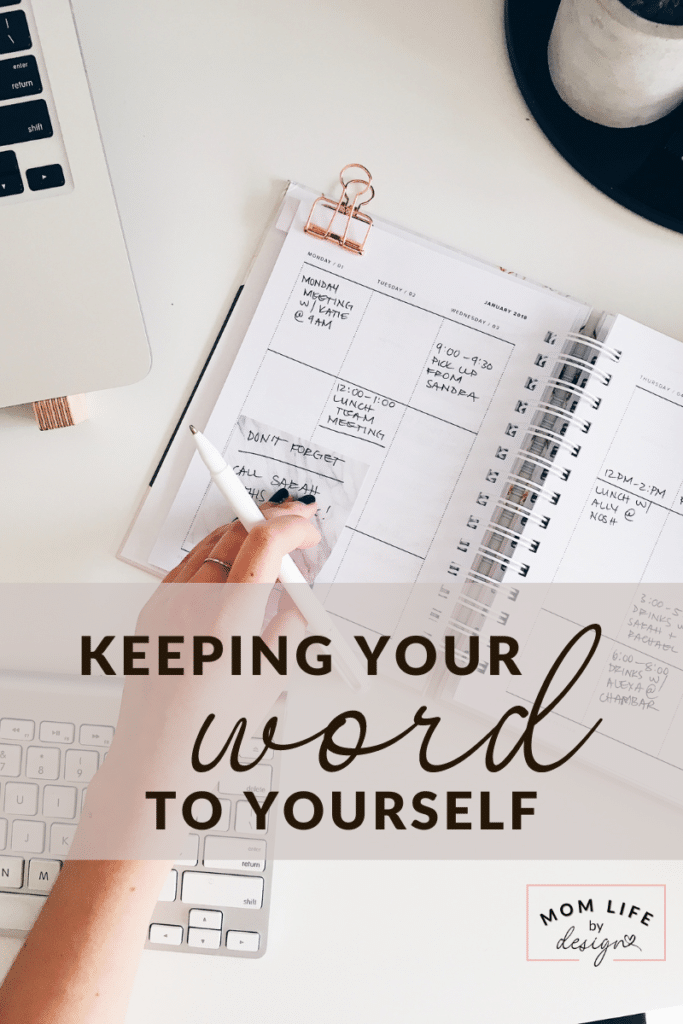Keeping Your Word to Yourself

Planning is Partnering with God
I’m not a planner by nature. I enjoy allowing the day to unfold as it will, leaning into what I feel great about, and avoiding the things that aren’t vibing with how I feel. I don’t like feeling boxed in or being bossed around by a to-do list. I’d much rather feel my way through the day!
The problem is that our feelings often lead us astray if we allow them to be the driver.
I have a holy calling, a purpose given to me by God himself. When I don’t prioritize that in my life because of circumstances or how I’m feeling, I’m allowing myself to become an idol that keeps me from serving and worshiping Him wholeheartedly.
It’s easy to put things off, again and again, until they don’t get done.
When we pass doing what we’re supposed to in favor of doing what we want, we’re rolling a snowball down the hill. It continues getting larger until it’s unwieldy and out of control.
Psalm 90:12 says “Teach us to number our days, that we may present to you a heart of wisdom.”
We learn to number our days from His instruction, allowing us to gain wisdom that we can then give back to him with our whole heart. When we understand that this life is finite, and that everything we do is for His glory, we can get on the same page with what God is doing.
Planning is my way of participating in God’s plan for my life. My allowing space and time on the calendar for what He’s called me to do.
By looking at my planner, I can tell if I’m agreeing with God or walking contrary to the purpose he’s given me. Right now, my purpose is wife, mama, homeschool teacher, coach. Are these roles reflected in what I plan to do this week?
How Do We Plan?
There’s no one right way to plan, except consistently. Whatever works for you is a great place to start. Planning is also a fluid thing – it’s not rigid. Don’t be afraid to start one way and switch to another as you practice.
I start by brain-dumping everything in my head. Our brains aren’t meant to hold all our information. We quite often use them as filing cabinets instead, which slows us down and can leave us feeling paralyzed with information overload.
You know how your computer runs slower when you have all those tabs open in a few different browsers? Our brains are the same. We’ve got to clean up the mental clutter, and a big brain dump helps us to let go of all those little things taking up valuable space because we can trust they will get done when they’re on paper.
When I brain-dump, I get everything out – from the household tasks that need to be done to the big picture items that God has called me to.
Often, once we get all the things that must be done out of our head, we realize many of the tasks are quick action items, and many aren’t urgent after all. They just felt heavy and urgent because they were occupying valuable brain space.
Most likely there will also be a few things in your brain dump that are either too large to be completed as is, or a vague idea of something that needs to be done.
Here, you can break that big item into smaller, actionable items to move towards completion. “Clean out the closet” can feel daunting and leave this on your to do list for weeks when you don’t know where to start. Instead, try putting the smaller steps down: “Go through sock drawer, remove dresses that don’t fit anymore, donate shoes I no longer wear, etc”
When you’ve finished your brain dump, now you just need to decide what needs to be done when. Look at the calendar and your personal responsibilities, and decide where there’s time to complete these tasks.
When you assign a time, stick to it, and show up at that time ready to complete the task at hand!
What We Do With the Plan Matters
We can’t just stop at planning. Most importantly, am I actually showing up to do what I’ve planned?
When we keep our word to ourselves, we’re agreeing with what we’re called to be. We’re showing up for our life purpose filled and ready to partner with God. When we don’t show up, when we push things off arbitrarily, we’re giving our circumstances and feelings more weight. Each time we slide into this, it becomes a little easier to do so the next time. We’re creating a path in our brain that is easier and easier to default to.
What we plan is important, but how we show up is even more so.
Do what you set out to do. Keep your word to yourself. As you continue to show up, your brain learns you can be trusted. You follow through. You partner with God on the mission He’s set before you, and in taking these little steps faithfully, you continue to bring Him glory.
Are you keeping your word to yourself or do you continually deflect what you should be doing in favor of what feels good at the time? How will you show up and stand in the mission God has called you to right here?
